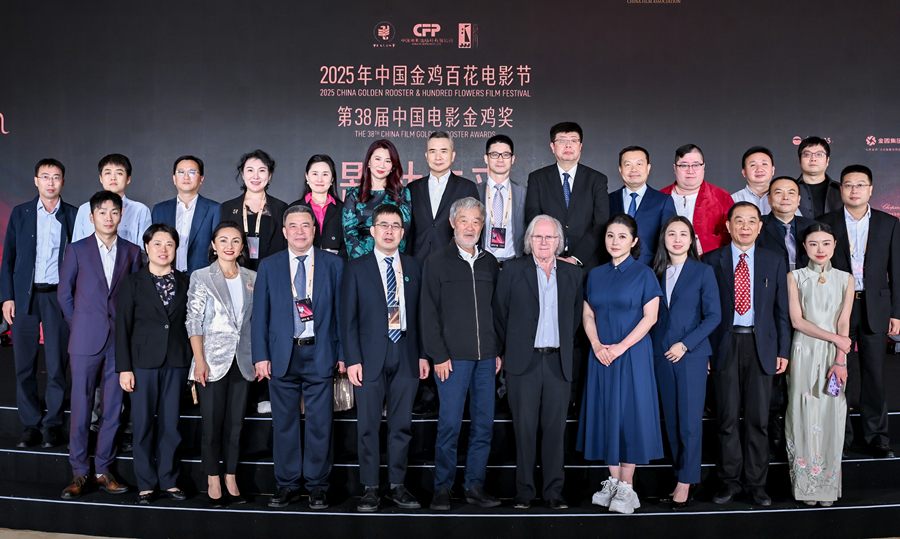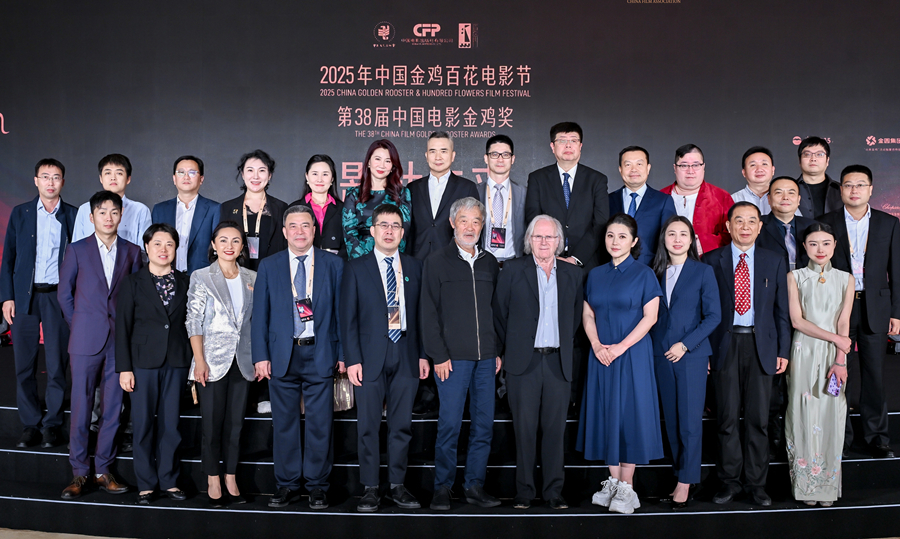The "CineMotion for the Future" event brought together more than 100 movie professionals and industry leaders in Xiamen, Fujian province, on Nov. 13 to explore the integration of new quality productive forces and the film industry, as well as how the arts can empower local economic and social development.

Organizers, distinguished guests and speakers pose for a group photo at the "CineMotion for the Future" event in Xiamen, Fujian province, Nov. 13, 2025. [Photo courtesy of China Film Press]
The event, held as part of the 2025 China Golden Rooster and Hundred Flowers Film Festival, saw attendees discussing new paths for the industry's development.
Yu Ning, chairman of China Film Press Co., Ltd., said the company, with support from the China Film Association, launched the CineMotion for the Future brand in Xiamen in June.
"CineMotion for the Future aims to host film-themed forums, screenings and exchanges, support themed film projects and promote public welfare initiatives," Yu said. "Building on the China Golden Rooster and Hundred Flowers Film Festival brand, it will foster high-level creative exchanges, expand film screenings and collaborations, and advance the broad development of film-related public welfare activities."
Actors Liu Jin, Yan Bingyan and Chen Wei, together with senior producer Ning Ning, launched a "green future" initiative at the event, calling for a low-carbon transformation of the film industry through technological innovation, individual responsibility, industry-wide collaboration and social advocacy.
Later, Liu, Chen and Ning joined producer Ning Ning, French director Philippe Muyl and Qian Guoqiang, a member of the U.N. Joint Implementation Supervisory Committee, for a panel discussion on how new quality productive forces can drive deeper integration between art and technology.
They noted that integrating new quality productive forces with the film industry's low-carbon efforts is helping the sector shift from traditional "high-energy consumption, large-scale productions" toward a "high-quality, sustainable" model.
The speakers called on filmmakers to "tell good green stories in their works and set good green examples in their lives," advocate for green development in film and television, practice high-tech, high-efficiency and high-quality production, maintain a humanistic core amid technological innovation, and lead the industry into a new phase of green development.
A second panel focused on filmmakers' creative storytelling about Lishe village, located in Wuxi, Jiangsu province, an area known for pioneering China's characteristic economic development model. Panelists explored ways to tap regional history and culture, showcase modern and contemporary China's development landscape, and interpret the Chinese urban spirit of honoring traditions while pursuing innovation.
Veteran filmmaker Tian Zhuangzhuang noted from his own experience that film production is closely linked to local economic development, and filmmakers should approach the communities where they shoot with dedication and passion.
Actress Yan Bingyan added that she always conducts field research and immerses herself in shooting locations before filming. " A well-made film can genuinely promote local culture, the economy and more. We need to care about every step of the creative process if we want to truly move the audience," she said.
Organizers said the successful holding of the "CineMotion for the Future" event holds far-reaching significance for this year's Golden Rooster film festival. By focusing on how technology and film can empower cultural tourism, the event has built a platform for theory and practice, offering valuable insights to deepen the integration of literature and art with local economic and social development, supporting the high-quality growth of the film and television industry.


 Share:
Share: 




 京公網安備 11010802027341號
京公網安備 11010802027341號